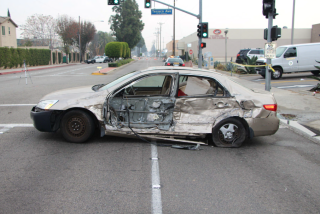$4.2-million settlement should end Dorner saga, officials say
A $4.2-million settlement between the city and two women mistakenly shot by Los Angeles Police Department officers will hopefully close a chapter on the Christopher Dorner story, officials said.
The money would compensate a mother and daughter who were shot by police in February during the manhunt for Dorner, an ex-LAPD officer who authorities say was hunting officers and their families.
The settlement announced Tuesday was remarkably speedy compared with other LAPD civil lawsuits, which can take years to be resolved.
FULL COVERAGE: Sweeping manhunt for ex-cop
City Atty. Carmen Trutanich was blunt in saying the city wanted to get the case, which has been a black eye for the LAPD, behind it as quickly as possible.
“Hopefully this will put an end to the Dorner saga once and for all,” Trutanich said. He said the agreement was a “no-brainer because the costs were going to skyrocket,” if negotiations dragged on and the case ended up in court.
“We got out of this thing pretty cheaply, all things considered,” he said.
However, the $4.2-million dollar payout raised eyebrows, with some legal experts saying it seemed unusually high for a case involving a police shooting that didn’t cause permanently debilitating injuries.
“It is fair, but high,” said Los Angeles civil rights attorney Carl Douglas.
David Klinger, a use-of-force expert at the University of Missouri in St. Louis and a former LAPD officer, also said the payout seemed high because neither victim faced long-term physical debilitation.
“Usually a payout of this magnitude typically comes in cases with crippling injuries and deaths,” he said.
The LAPD has from the beginning described the incident as a tragic mistake by officers. Police Chief Charlie Beck met with the women a few days after the shooting to personally apologize, and he launched an investigation into the conduct of officers in the matter. That probe is ongoing; as of Tuesday, the eight officers involved remain off patrol duties.
Margie Carranza, 47 and her mother, Emma Hernandez, 71, were hurt when a Toyota truck they were driving on a Torrance street was repeatedly shot by LAPD officers in the early morning hours of Feb. 7.
The women, who were delivering the Los Angeles Times in a quiet suburban neighborhood, had unknowingly driven down a street that included the heavily guarded home of an LAPD captain who authorities said was named by Dorner in an online manifesto airing his grievances against law enforcement.
Carranza ended up with superficial wounds while her mother was hit twice by bullets in the back, their lawyers said. Both have recuperated physically.
At a Tuesday news conference near City Hall, lawyers on both sides of the case hailed the payout as reasonable.
“I have a 71-year-old client,” said Glen Jonas, the women’s lawyer. “You think she wants to risk the appellate court reversing it for one reason or another? $4.2 million means a lot more to her today than potentially $7 million 10 years down the road.”
The settlement must now be approved by the City Council, which typically rubber-stamps such payouts. Council approval would end a public dispute between the city and lawyers for Carranza and Hernandez -- wrangling highlighted most recently over a disagreement over how best to replace the damaged truck.
The LAPD had pledged to replace the truck, but the offer bogged down in a public spat when the truck wasn’t speedily delivered. When the women were finally offered a replacement, it was a different model and the women were told they would have to pay taxes on the vehicle. The battle over the truck ended recently when the city agreed to give the women $40,000 to replace the vehicle.
ALSO:
New charges filed in L.A. County assessor scandal
Man lost for a week in Northern California survived on pine nuts
Women’s settlement with LAPD in Dorner case worth $4.2 million
More to Read
Sign up for Essential California
The most important California stories and recommendations in your inbox every morning.
You may occasionally receive promotional content from the Los Angeles Times.











